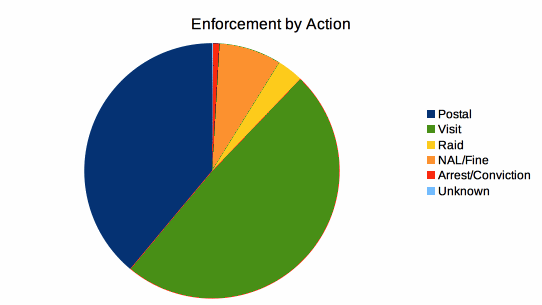The FCC’s trend of hunting unlicensed broadcasters may be slowing down.
The number of enforcement actions against unlicensed broadcasters fell off dramatically during 2010 – from a record single-month high of 75 in April to just 9 (known so far) in November. May and June represented pivotal months in this decline.
Barring a massive run of enforcement actions over the next two weeks, 2010 will represent the first cumulative decrease in the FCC’s pirate-hunting efforts after four consecutive record-breaking years.
There’s been a definite uptick in unlicensed AM stations on the dial – more than double the year before, although they still count for a tiny minority (5%) of broadcasters noticed by the FCC. LPAM stations have been reported in six states this year, the majority residing on the expanded AM band.
 With regard to enforcement effectiveness, the cumulative statistics on the type of “bust”-activity tell the tale. 94% of all actions documented in the Database are wholly administrative (visits/warning letters/monetary forfeitures). Of those, 90% carry no material harm.
With regard to enforcement effectiveness, the cumulative statistics on the type of “bust”-activity tell the tale. 94% of all actions documented in the Database are wholly administrative (visits/warning letters/monetary forfeitures). Of those, 90% carry no material harm.
In 2010, just 4% of enforcement actions reported to date are Notices of Apparent Liability or Forfeiture. The FCC has not precipitated any raid on its own this year (it assisted in a Florida takedown spearheaded by local cops).
In Florida, where a state anti-pirate radio law went on the books in 2004, a whopping 28 arrests have been arrested in six years. If there are convictions, it appears that most cop to a lesser plea, making actual criminal convictions achieved under the anti-pirate law almost nil. Florida remains the most active state in the country for unlicensed broadcasting, with New York a close second.
Part of me believes this is an effect of the economy and belt-tightening within the FCC, coupled with a growing concern about other forms of unlicensed radio enforcement (like consumer electronics devices that harm various forms of wireless communication services). It is not likely a politically-driven change in enforcement strategy.
That is, of course, good news for the hundreds of unlicensed microbroadcasters on the air, whose numbers are constantly replenished as the FCC tries unsuccessfully to prohibit direct citizen access to the airwaves. Not all radio pirates are good eggs, but the overwhelming majority of them are, motivated by some sort of unmet need in the communities they serve.
Recently, while watching this, I remembered seeing this 12 years ago. The difference between the two strikingly illustrates the schism that occurred during the formation of LPFM between its advocates and those engaged in electronic civil disobedience.
That has turned out to be an unfortunate legacy, because the aggregate number of unlicensed microbroadcasters on the air is probably larger now than it was back then, but they’re by no means organized around a movement paradigm. The pirates aren’t marching on D.C. anymore; they’re too busy broadcasting with near impunity.
Skip to content